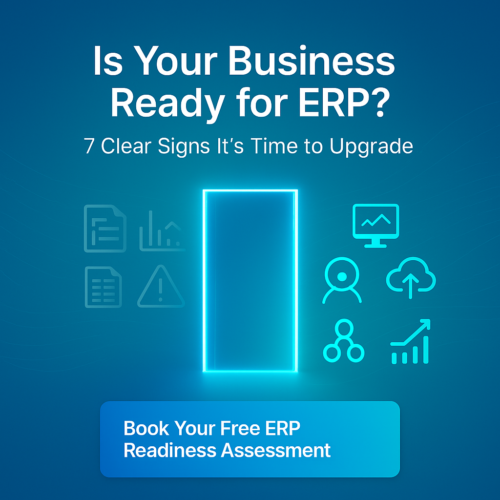Is Your Business Ready for ERP? 7 Signs It’s Time to Upgrade
In today’s fast-moving business world, staying competitive means more than just offering quality products or services. It requires efficiency, agility, and complete visibility into operations. This is where Enterprise Resource Planning (ERP) systems come in. ERP is no longer just an advanced tool for large enterprises—it has become a necessity for businesses of all sizes that want to scale, optimize resources, and make smarter decisions.
Yet, many organizations delay ERP implementation because they believe their existing systems—spreadsheets, legacy tools, or disconnected software—are still “good enough.” The reality? These outdated methods can cost you time, money, and opportunities.
If you are unsure whether your company is truly ready for ERP, here are 7 undeniable signs it’s time to upgrade your business with ERP software.
1. Heavy Dependence on Spreadsheets and Manual Work
Spreadsheets are great for quick calculations but not for running an entire business. If your teams spend hours updating Excel sheets, reconciling numbers, or manually preparing reports, you are losing productivity. Worse, manual data entry often introduces costly errors.
An ERP system automates routine tasks, centralizes data, and provides accurate reports at the click of a button—eliminating inefficiencies and human error.
SEO Insight: Businesses searching for “why ERP is better than spreadsheets” are often at the awareness stage—this is your chance to highlight ERP as the smarter alternative.
2. Lack of Real-Time Insights and Visibility
Can your leadership team instantly answer questions like:
- What are our current inventory levels?
- How much revenue did we generate this week?
- Which departments are performing below expectations?
If the answer requires multiple phone calls, data requests, or waiting for manual reports, your systems are outdated.
Modern ERP solutions provide real-time dashboards and analytics, empowering decision-makers with accurate, up-to-the-minute insights across sales, finance, operations, HR, and more.
3. Slow, Repetitive, and Error-Prone Processes
Manual data entry, paper-based approvals, and disconnected workflows slow down operations and increase the risk of mistakes. If employees are spending more time fixing errors than focusing on strategy, your business is falling behind.
ERP software automates core processes like order management, invoicing, procurement, and payroll—freeing up teams to focus on innovation and growth.
4. Disconnected Systems Across Departments
When sales, finance, HR, and operations each rely on different software tools that don’t communicate, data silos form. This results in duplication of effort, conflicting reports, and communication gaps.
With an integrated ERP system, all departments share a single, centralized platform—creating a “single source of truth” for the entire organization. This improves collaboration, accuracy, and transparency.
5. Declining Customer Experience
Customers today expect speed, accuracy, and personalization. If your business struggles with:
- Incorrect orders
- Slow response times
- Inconsistent customer data
- Poor visibility into product availability
…it’s a red flag.
ERP systems integrate Customer Relationship Management (CRM) with inventory, sales, and support, ensuring faster responses, error-free transactions, and stronger customer relationships.
6. Compliance and Reporting Challenges
For many industries, compliance with regulations such as taxation, data privacy, or quality standards is critical. If generating compliance reports is complex, time-consuming, or prone to errors, you may be putting your business at risk.
ERP solutions simplify compliance by automating audit trails, tracking regulatory requirements, and generating accurate reports effortlessly.
7. Business Growth Outpaces Your Current Systems
Are you scaling into new markets, adding more products, or hiring more employees? If your current tools struggle to keep up, it’s time to re-think your infrastructure.
Legacy systems often crash under increased workloads or lack scalability. ERP software is built to grow with your business, providing the flexibility and strength needed to manage expansion seamlessly.
Why ERP Is a Strategic Investment, Not Just a Tool
Implementing ERP is not just about software—it’s about transforming the way your business operates. With ERP, you gain:
- Operational efficiency through automation
- Data-driven decision-making with real-time insights
- Improved collaboration across departments
- Customer satisfaction through faster, more accurate services
- Future scalability to support long-term growth
Simply put, ERP helps you run leaner, smarter, and stronger.
Final Thoughts: Is Your Business Ready for ERP?
If you recognize several of the signs above, your business is already being held back by outdated systems. Upgrading to ERP can unlock new levels of productivity, profitability, and growth.
Don’t wait until inefficiencies cost you more—take action now. Book your free ERP readiness assessment and find out how prepared your business is for digital transformation. Our experts will help you evaluate your current systems and design a roadmap to successful ERP implementation.


